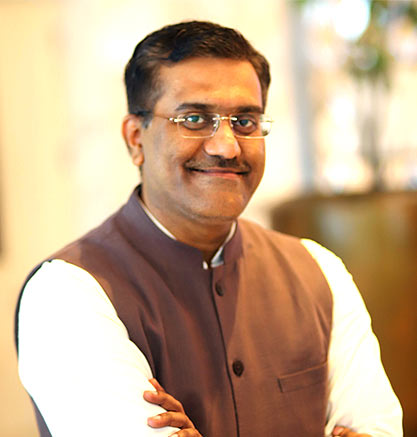-
CENTRES
Progammes & Centres
Location
The titans of tech evade regulations on the ground of free speech as they rake in profit from misinformation in host countries, while complying to similar regulations back home.

On 7 February 2022, the United States Department of Homeland Security (DHS) released its latest national terrorism advisory. Besides its usual overview of the terrorist threat to the US homeland, the advisory stands out for mentioning two points. First, it highlights “widespread online proliferation of false or misleading narratives regarding unsubstantiated widespread election fraud and COVID-19.” It adds that this is one of the key factors contributing to the current heightened threat environment in the United States (US). Secondly, it mentions that DHS is “working with public and private sector partners, as well as foreign counterparts, to identify and evaluate “mis-, dis-, and mal-information” (MDM), including false or misleading narratives and conspiracy theories spread on social media and other online platforms that endorse or could inspire violence.”
These two points taken together imply that anyone posting MDM on social media about COVID-19 or elections will be potentially regarded as a domestic threat actor and, therefore, subject to surveillance. Given the general vaccine hesitancy in the US and the role of MDM in furthering it, DHS has its reasons to pursue such a course of action. However, what is important to highlight here is the wide cooperation that social media platforms—‘Big Tech’—are extending to the government in moderating the content on their websites and carrying out surveillance.
Given the general vaccine hesitancy in the US and the role of MDM in furthering it, DHS has its reasons to pursue such a course of action.
Of course, the complicity of Big Tech in working with the American State for surveillance and complying with its regulations is not new.
As revealed by whistle-blower, Edward Snowden in 2013, Big Tech platforms including Microsoft, Google, YouTube, Facebook, and Apple had all willingly participated in the PRISM digital surveillance programme executed by the US National Security Agency (NSA). Acting as surveillance intermediaries, these social media platforms helped the NSA harvest communications content and associated metadata.
Compare this cooperative attitude in the US. to Big Tech’s confrontationist approach towards the Indian security establishment in similar matters of disinformation and propaganda.
Last year, on Republic Day, when farmers’ protests in Delhi peaked with the violence at the Red Fort, the Indian government directed social media platforms to take down the anti-India content and some accounts that it believed incited violence. However, platforms like Twitter played hardball by taking a stubborn position. Although it temporarily suspended hundreds of accounts, Twitter refused to put an outright ban on such content, arguing that its position was as per its “principles of defending protected speech and freedom of expression”.
A similar defiant attitude was displayed when the government on 25 February 2021 notified new norms under the Information Technology (Intermediary Guidelines and Digital Media Ethics Code) Rules, 2021, classifying many Big Tech platforms as ‘significant social media intermediaries’. These rules mandated additional due diligence, including publishing monthly compliance reports, identifying the “first originator of the information,” and appointing a nodal officer for 24x7 coordination with law enforcement agencies. In response, Twitter resisted compliance and argued that the new rules undermined free speech. Meanwhile, Facebook-owned WhatsApp messaging service sued the Indian government claiming that the new rules would violate the privacy of its users.
Although it temporarily suspended hundreds of accounts, Twitter refused to put an outright ban on such content, arguing that its position was as per its “principles of defending protected speech and freedom of expression”.
This is the hypocrisy of Big Tech, where it is selective in choosing which national rules to comply with and which to resist. This selective approach enables it to profit from the hate speech and disinformation thriving on its platforms while grandstanding about free speech and hiding behind ‘safe harbour provision’ when it comes to complying with national rules. This is the capitalist and colonial mindset of Big Tech at work. It will abide by the western governments’ regulations, given the latter’s strong anti-trust laws and stringent regulatory pressure, but when it comes to the developing world’s regulations, Big Tech will seek leeway.
Big Tech platforms may think they face no accountability for their cherry-picking behaviour. However, it is time India shows the way forward by making the Big Tech platforms answerable, what Dr Samir Saran has termed as ‘Accountable Tech’. The West has the template of anti-trust and Big Tech break-up to deal with the social media platforms. India need not necessarily emulate it. Instead, it can strengthen the anti-competition regulations, design a robust content code, enforce data localisation, and foster an ecosystem of social media platforms. By doing this, India can protect its citizens’ data and privacy, shield them from harmful content while simultaneously creating a fair marketplace and stimulating innovation. Such an approach will demonstrate India’s commitment to an inclusive global digital order and give a sense of ownership to the developing world.
If democracy is to stay alive and well, the technological environment surrounding it must be constantly guarded and regulated. This argument may come across as ‘digital nationalism,’ but it is a necessary step to protect India’s sovereignty given its experience with political mobilisation, social divisions, and violence.
The views expressed above belong to the author(s). ORF research and analyses now available on Telegram! Click here to access our curated content — blogs, longforms and interviews.

Dr Sameer Patil is Director, Centre for Security, Strategy and Technology at the Observer Research Foundation. His work focuses on the intersection of technology and national ...
Read More +